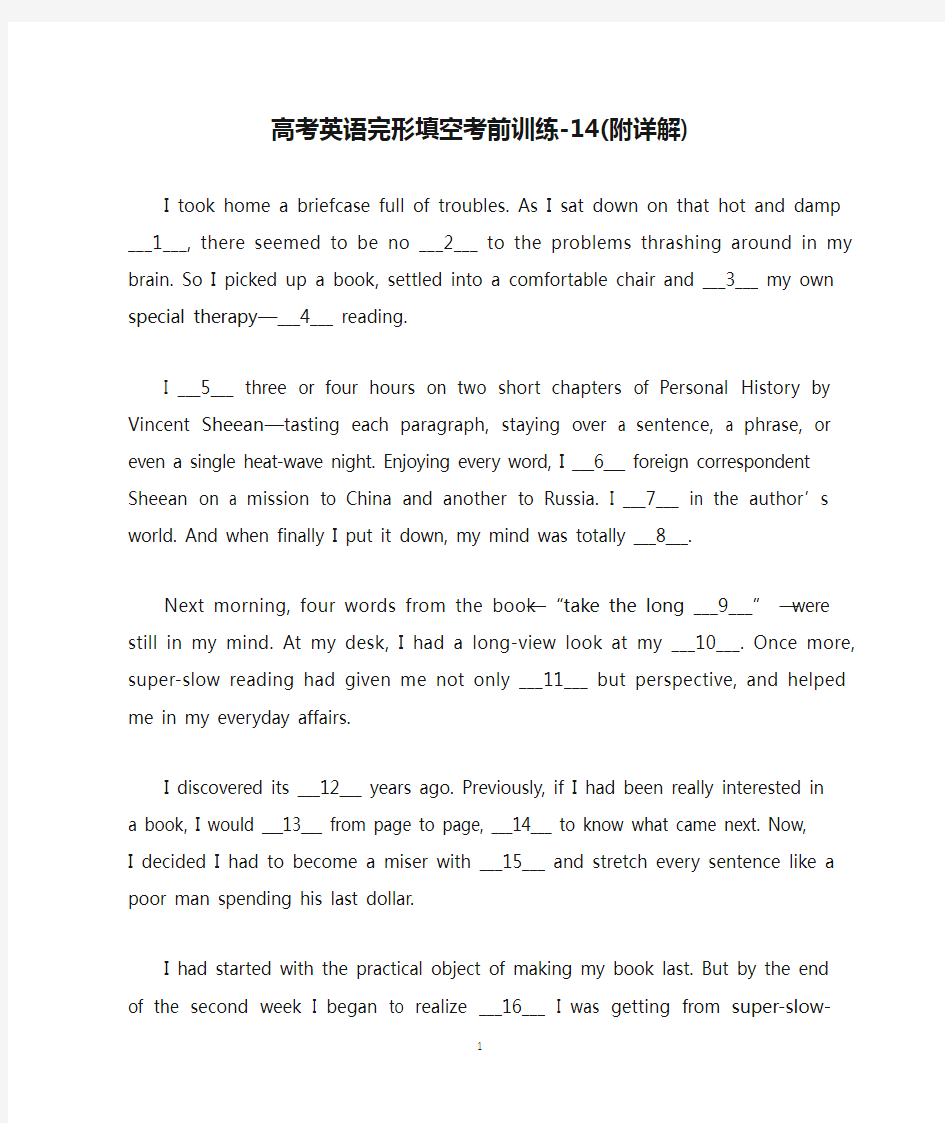高考英语完形填空考前训练-14(附详解)


高考英语完形填空考前训练-14(附详解)
I took home a briefcase full of troubles. As I sat down on that hot and damp ___1___, there seemed to be no ___2___ to the problems thrashing around in my brain. So I picked up a book, settled into a comfortable chair and ___3___ my own special therapy—___4___ reading.
I ___5___ three or four hours on two short chapters of Personal History by Vincent Sheean—tasting each paragraph, staying over a sentence, a phrase, or even a single heat-wave night. Enjoying every word, I ___6___ foreign correspondent Sheean on a mission to China and another to Russia. I ___7___ in the author’s world. And when finally I put it down, my mind was totally ___8___.
Next morning, four words from the book—“take the long ___9___”—were still in my mind. At my desk, I had a long-view look at my ___10___. Once more, super-slow reading had given me not only ___11___ but perspective, and helped me in my everyday affairs.
I discovered its ___12___ years ago. Previously, if I had been really interested in a book, I would ___13___ from page to page, ___14___ to
know what came next. Now, I decided I had to become a miser with ___15___ and stretch every sentence like a poor man spending his last dollar.
I had started with the practical object of making my book last. But by the end of the second week I began to realize ___16___ I was getting from super-slow-reading itself. Sometimes just a particular phrase ___17___ my attention, sometimes a sentence. I would read it slowly, analyze(分析)it, read it again—perhaps changing down into an even ___18___ speed—and then sit for 20 minutes thinking about it before moving on. I was like a pianist ___19___ a piece of music, phrase by phrase, practicing it, trying to discover and ___20___ exactly what the composer was trying to convey.
1. A. day B. morning C. afternoon
D. evening
2. A. solutions B. doubt C. wonder
D. courses
3. A. tried B. applied C. practiced
D. managed
4. A. fast B. super-fast C. super-slow
D. slow
5. A. spent B. wasted C. cost
D. took
6. A. united B. attended C. attracted
D. joined
7. A. found B. lost C. persuaded
D. accepted
8. A. broken B. discouraged C. refreshed
D. awaken
9. A. view B. care C. walk
D. distance
10. A. therapy B. problems C. reading
D. work
11. A. difficulty B. success C. achievement
D. pleasure
12. A. use B. disadvantage C. worth
D. importance
13. A. race B. read C. analyze
D. digest
14. A. worried B. eager C. glad
D. anxious
15. A. books B. troubles C. words
D. music
16. A. how well B. how long C. how many
D. how much
17. A. caught B. missed C. escaped
D. paid
18. A. faster B. higher C. lower
D. slower
19. A. playing B. studying C. writing
D. singing
20. A. realize B. recognize C. repay
D. recreate
【答案与解析】
本文是一篇说明文。作者主要介绍了当自己思绪翻腾时一种适合于自己的解决方法——超慢速阅读(super-slow reading)。作者通过举例和打比方等说明方法详细地解释了super-slow reading的特点及其效果。
1. D。根据文章首句意义“下班回家”,以及第三段首句时间状语next morning 可知,作者要说的是在他“晚上”下班回家以后所发生的事。
2. A。根据句意“对于这些在头脑中翻腾的问题似乎没有什么解决方法”及后文中的…therapy (疗法) 可知此处应填入solutions。
3. B。从第4段第1句可知,作者早在几年前就发现了super-slow reading的价值了,故不存在“试用,实践”这一特殊疗法,而是“实施,运用”这一方法。
4. C。从第3段最后一句可知。
5. A。从下文意义可知,作者是“花费”了,而不是“浪费”了两个小时读了两个短的章节。人“花”时间应用spend。
6. D。join sb 意为“和某人在一起”。
7. B。lose oneself in…意为“使自己完全沉浸在……之中”。这两句可理解为:作者已不在家累,而是和外国通讯员Vincent Sheean一起到中国和俄罗斯完成使命去了。作者已完全沉浸在书的情节中。
8. C。根据后文内容可知,在作者读完书以后,他的那些烦恼都烟消云散,精神完全恢复。refresh 意为“精神恢复”。
9. A。从下一句At my desk, I had a long-view look …可知。take the long view意为“有长远观点”。
10. B。此句句意为:用长远的观点来看待这些眼前的“问题”。
11. D。从上文意义可知,“超慢速阅读”能使作者消除烦恼,而且让他懂得了要用长远的观点看待问题。,此句句意为:“超慢速阅读”不仅给作者带来了“快乐”,
而且还教给他看待问题的角度。
12. C。根据后文内容推知,作者早在数年前就已发现了“超慢速阅读”的“价值”。
13. A。race在此意为“比速度,快速”。在先前,如果作者真正对某一本书感兴趣,他往往一页一页地快速看过去。
14. B。作者对一本书感兴趣,便一页一页地快速读,“渴望”了解书中接下来的内容。
15. C此句句意为:现在决定,在读一本书的时候,要认真对待书中的“每一个字”,要像一个穷人在花他的最后一块钱一样来细读书中的每一个句子。
16. D。how much为抽象意义,在句中用作宾语。
17. A。catch one’s attention意为“吸引某人的注意”。
18. C。根据前一分句“慢读,分析,再读”意义可知,作者在阅读时,如有必要,或许会以更慢速度阅读。Speed“速度”通常不可由形容词fast, slow修饰。表示速度“快、慢”,常用high, low表达。
19. B。句意为:作者在阅读一本书时就像一位钢琴家“研究”每一个乐曲一样,一个短语一个短语地,分析它。
20. D。尽量能发现和“想象出”创作者想表达的意思。
